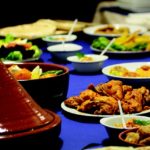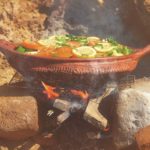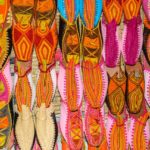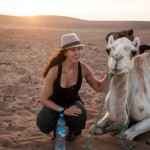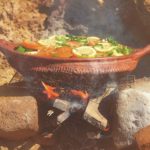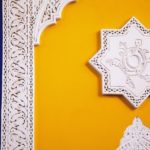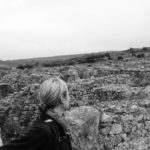Welcome to the High Atlas Mountains
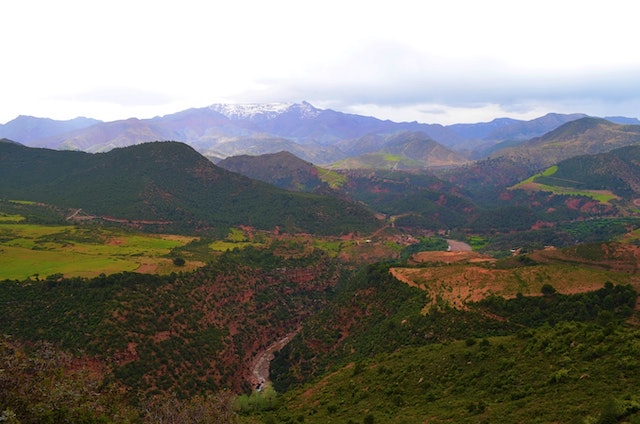
After four flights, and 40 hours, I am sitting in the Casablanca departure lounge waiting for my fifth and final flight to Marrakech. The boarding lounge is decoated in Stalinesque Cold War architecture meets art deco. I’m exhausted and not for the first time I ask myself ,‘What am I doing here?’
A few months earlier I had applied to the Atlas Cultural Foundation asking to be involved in their voluntary English tutoring programme located in the province of Zawiya Ahansal in the High Atlas Mountains. Cloe Erikson, the founder, had accepted my application and now I am on my way.
The mountains are close and hard with stone and rock formations, tussocky trees dot the hillsides, and roads are cut into the rock’s wall.
Arriving in Marrakech, I am picked up by Ayoub, Cloe’s personal assistant, who has been waiting patiently while I take two hours to get processed through customs. After a good night’s sleep, we travel up to Zawiya Ahansal, arriving at my temporary home for the next 20 days, the Dar Ahansal.
After unpacking, I acquaint myself with my beautiful room and balcony – I already love this place. The mountains are close and hard with stone and rock formations, tussocky trees dot the hillsides, and roads are cut into the rock’s wall. I am welcomed by a thunder and lightning storm and lots of wind. The wind comes up so very suddenly and then disappears immediately.
Each day I am served a substantial breakfast, followed by three courses for both lunch and dinner. I am treated like a princess, albeit with an expanding waistline. The food is healthy and tasty, prepared and served with love by Fadma and Said. There’s couscous, tagine, kefta, salads, soup, khobz (one of the many types of bread), and of course, lots of mint tea and coffee. I am taught to say sha-bat when I am full, and I modify it to ‘I’m getting sha-bat-er and sha-bat-er with each meal.’
The next day, Ayoub introduces me to Ismail, my translator and guide, and Hassan my tutor in Darija and Berber. We go on an orientation walk around the two villages, Amezray and Agoudim, stopping to look at the laundry wash station that ACF has built to enable the women to wash the clothes under cover. We visit a restored granary (ighrm), walking through narrow pathways beside the river; passing women, children, men, and donkeys carrying produce; exchanging gentle greetings; and then arriving at the sheik’s house for mint tea and more food.
The following day, I walk the short distance to my classroom, where the beautiful, eager faces of the children greet me. Ismail introduces me and then we begin getting to know each other. We talk of my family and country, we play games, and sing songs. The students, aged 10 to 13, are keen to learn and are polite and respectful to each other and to me. They are such a pleasure to teach.
This pattern is repeated over the next couple of weeks. After each class is dismissed, Ismail, Zahira, Chefiya, and I review the day’s progress and plan ahead. If time allows, we play a couple of rounds of cards before wandering off to our various homes for lunch and a delightful siesta.
Check out Pink Pangea’s Writing, Yoga, and Meditation Retreats.
Usually in the afternoon, I have my private language lesson with Hassan, who patiently answers my many questions about Darija and Berber. I use my newfound language to greet women in the orchards and fields by the river as I go for my afternoon walks. Each day, I discover more countryside, meet new people and am greeted warmly in return by the villagers.
On one occasion, my sense of adventure takes me off the beaten track and I have to scramble up a small wall to get back to the path. I remind myself that this country is in Africa and is not New Zealand, so I must keep an eye out for creepy crawlies and creatures that bite and sting.
One day is particularly wet but I am determined to continue with my daily walk. I put on my raincoat and half an hour into my walk, one of the villagers sees me walking in the rain. Feeling sorry for me, she sends her son, Lahcan out to escort me back to the Dar. She must think I’m lost as no one in her right mind would go walking in the rain. She doesn’t realise that I am from Aotearoa, the ‘Land of the Long White Cloud’ and that I’m used to the rain.
I remind myself that this country is in Africa and is not New Zealand, so I must keep an eye out for creepy crawlies and creatures that bite and sting.
We come to a flooded piece of road, and while Lahcen jumps across it, I know that my five foot tall body and little legs aren’t able to jump that far. Two of my students, Moustapha and Basso, are laughing on the other side of the road and they put stepping-stones down for me to walk across. Once across, Lahcen dutifully delivers me to the front door of the Dar and then walks the thirty minutes back to his house in the rain.
On my final night, I’m siting in the dark on the ledge of my balcony watching the spectacular thunder and lightening storm. Tomorrow, I will have my farewell walk around the village before packing my bags for my return journey to Marrakech and the next part of my adventure. I will return to this beautiful place – Inshallah.
Photo credit by Unsplash.

